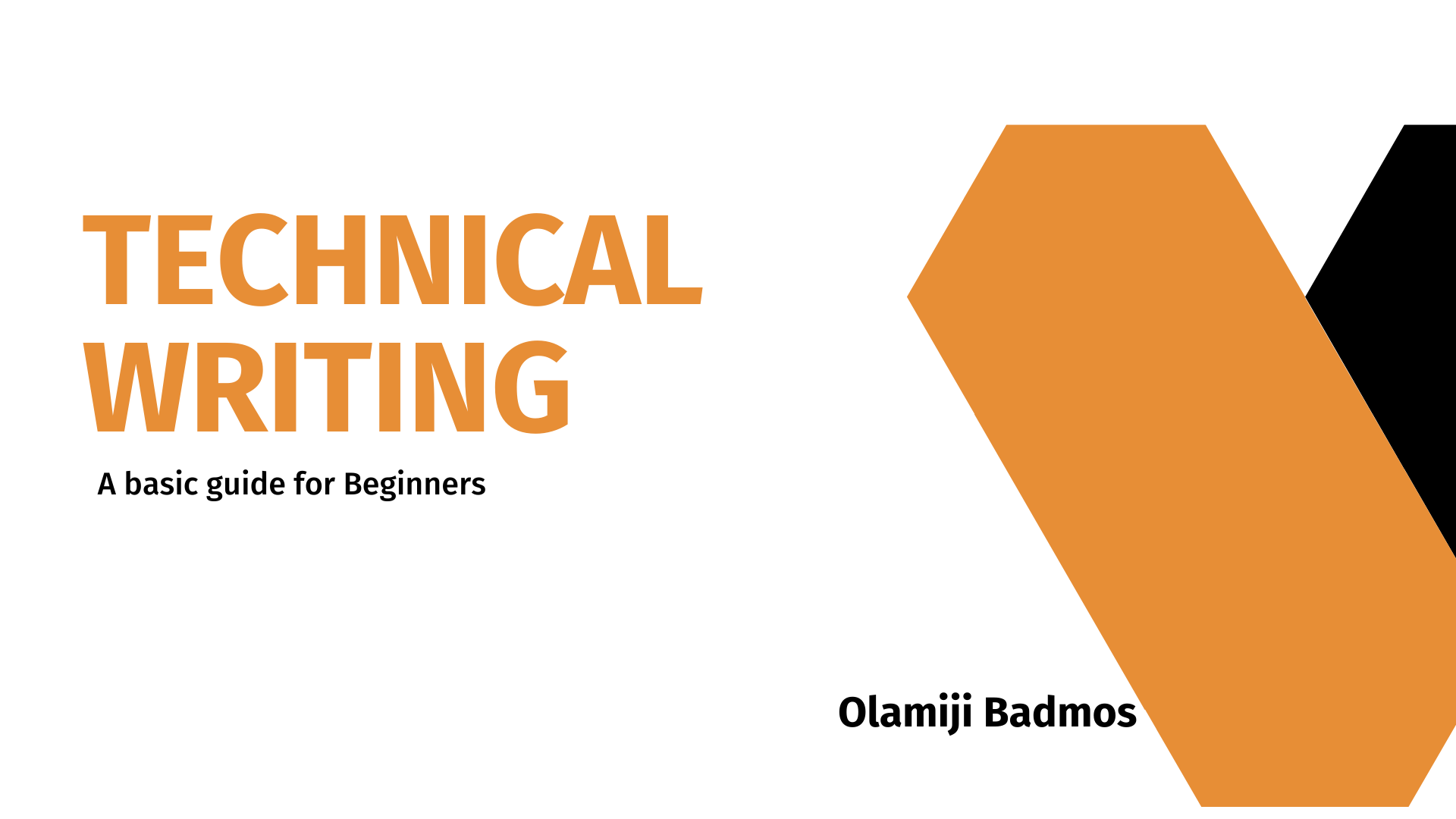Technical Writing- A basic guide for Beginners
 Olamiji Badmos
Olamiji Badmos
I know you've been wondering what technical writing is?
Technical writing is the art of providing detail-oriented instruction to help users understand a specific skill or product.
If you've always wanted a career in tech, love writing, teaching others, already in tech that don't really fancy coding all day or looking for something else you can do. Technical writing could be a suitable career for you.
A technical writer is someone who writes instructions or technical documentation such as user manuals, support articles, or internal docs for developers. A technical writer presents the technical information in a way that readers can use that information for an intended purpose.
You do not need a degree in technical writing to start putting out technical content. All you need to do is Just Start Writing
We will be looking at the fundamentals and also what you should consider when getting started with technical writing.
Necessary Skills to Have as a Technical Writer
- The use of proper English and Possess some writing skills: It is always necessary to have a good grasp of English and basic grammar before considering writing. Also, one can only learn how to write by actually writing. You might never know you have it in you to write until you put pen to paper. And the only way out is to keep writing.
Know how to explain things clearly and simply: This is a very crucial skill. Knowing how to implement a feature doesn't necessarily mean you can clearly communicate the process to others.
Experience in the technical field: This isn't a must but it is a huge advantage over others to have some experience or strive to get knowledge in the technical field such as product management, quality assurance, user experience, engineering and business development.
Technical Writing Process
The biggest factor to consider when you're writing a technical article is to analyze and understand who your readers are that is your intended/expected audience. A good technical writer writes based on the reader’s context. To understand your reader, you need to ask yourself some certain questions before writing:
- Who are my readers?
- What do they need?
- Where will they be reading?
- When will they be reading?
- How will they be reading?
- Why will they be reading?
These questions also help you think about your reader's experience while reading your writing. Also, as a technical writer you need to make a decision on how to present the documentation content such as:
- What your users need to know
- How will they use the documentation
- How much time do you have to work on the project
- How many different deliverables are produced from the same content
- Whether the documentation is task based or reference based in a technical field.
Don't get confuse, I will briefly explain what I meant by a documentation is task based or reference based. Let's dive into it.
A task-based approach is what the users does, the instructions on how to operate the product, to accomplish the task the user performs while a reference based approach is what the product or article you are writing about does, what it looks like and also what each menu, item, button(features) do.
In a real world, a reference based approach takes less time to develop than a task based approach because there is less thinking and planning.
It is always advisable for a technical writer to identify the key goals for users of the product and then for each goal, create a scenario of how users will accomplish the goal.
Necessary Knowledge to Succeed:
As I stated earlier, it is a huge benefit to have some experience in the technical field to succeed as a technical writer. There are three(3) types of knowledge listed below:
- The Product Knowledge: This is an understanding of a product or service. A technical writer understands the product application ,function, feature, use and support requirements.
- The Technical Knowledge: This is the logical understanding of how systems and processes work and interact with each other.
- The User Knowledge: You should basically know what your audience wants, look for analytics where you can get information about potential uses.
Importantly, there are many reasons why it's a good idea for a technical writer to gain extensive product and technical knowledge because:
- You as a technical writer will gain respect from the developers and be able to talk with them with intelligence.
- You will be able to determine whether the information you received or read for the report is correct.
- You will be able to write much faster than you would if you know nothing.
- You will also have confidence that your documentation is accurate even when it has not been sufficiently reviewed by the subject matter experts.
Fun Fact: The more knowledge you have, the better documentation you can create.
Understanding Audience and Purpose
Remember, the goal is to write a document that is both useful to and useable by your readers. Bearing in mind who your users are, you can then conceptualize and plan out your documentation. This process consists of planning, drafting, revising, editing and proofreading. It is also advisable for a technical writer to avoid excessive jargons, limit the vocabulary, define abbreviation, keep sentences short and use active voice in the documentation for effective communication.
Conclusion
One of the interesting part about gaining a product knowledge is that technical writers often are not the real users of the product they document. You need to learn a wide body of research skills, set up a small focus group or send out a very direct survey. A technical writer need to focus on what the user wants to know about the product.
It is advisable for a technical writer by being the user. This is probably the most important thing about any job, regardless of your like or dislike of the product.
Technical writers have to be always eager to learn something new and not be afraid of it, which means technical writers are not only writers but also learners.
Note that all you need is to start writing such as writing on your personal blog and contribute to open source on GitHub. You can also write about a product you love to use, but its documentation is poorly written or not in existence.
I'm glad you now understand what technical writing entails.#
Start writing... Can't wait to see your technical articles
References
Subscribe to my newsletter
Read articles from Olamiji Badmos directly inside your inbox. Subscribe to the newsletter, and don't miss out.
Written by

Olamiji Badmos
Olamiji Badmos
👋 Hi, I'm a Frontend Developer and Technical Writer. 🚀 I craft user-friendly web apps with ReactJs and VueJs. ✍️ Sharing tech knowledge through writing. I'm fueled by a boundless enthusiasm for learning, empowering me to delve into any subject matter to create engaging and compelling content. My passion for exploring new realms and translating complex concepts into accessible, user-friendly content drives my writing.